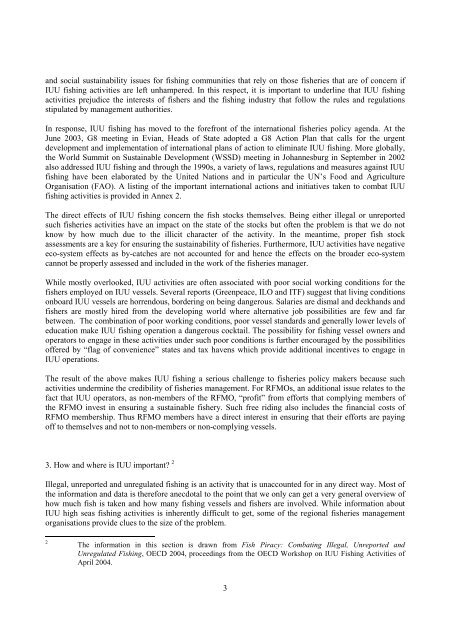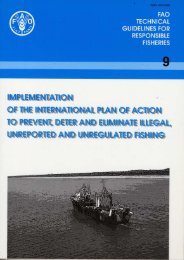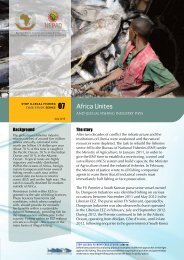1 Addressing Illegal, Unreported and Unregulated (IUU ... - OECD
1 Addressing Illegal, Unreported and Unregulated (IUU ... - OECD
1 Addressing Illegal, Unreported and Unregulated (IUU ... - OECD
You also want an ePaper? Increase the reach of your titles
YUMPU automatically turns print PDFs into web optimized ePapers that Google loves.
<strong>and</strong> social sustainability issues for fishing communities that rely on those fisheries that are of concern if<strong>IUU</strong> fishing activities are left unhampered. In this respect, it is important to underline that <strong>IUU</strong> fishingactivities prejudice the interests of fishers <strong>and</strong> the fishing industry that follow the rules <strong>and</strong> regulationsstipulated by management authorities.In response, <strong>IUU</strong> fishing has moved to the forefront of the international fisheries policy agenda. At theJune 2003, G8 meeting in Evian, Heads of State adopted a G8 Action Plan that calls for the urgentdevelopment <strong>and</strong> implementation of international plans of action to eliminate <strong>IUU</strong> fishing. More globally,the World Summit on Sustainable Development (WSSD) meeting in Johannesburg in September in 2002also addressed <strong>IUU</strong> fishing <strong>and</strong> through the 1990s, a variety of laws, regulations <strong>and</strong> measures against <strong>IUU</strong>fishing have been elaborated by the United Nations <strong>and</strong> in particular the UN’s Food <strong>and</strong> AgricultureOrganisation (FAO). A listing of the important international actions <strong>and</strong> initiatives taken to combat <strong>IUU</strong>fishing activities is provided in Annex 2.The direct effects of <strong>IUU</strong> fishing concern the fish stocks themselves. Being either illegal or unreportedsuch fisheries activities have an impact on the state of the stocks but often the problem is that we do notknow by how much due to the illicit character of the activity. In the meantime, proper fish stockassessments are a key for ensuring the sustainability of fisheries. Furthermore, <strong>IUU</strong> activities have negativeeco-system effects as by-catches are not accounted for <strong>and</strong> hence the effects on the broader eco-systemcannot be properly assessed <strong>and</strong> included in the work of the fisheries manager.While mostly overlooked, <strong>IUU</strong> activities are often associated with poor social working conditions for thefishers employed on <strong>IUU</strong> vessels. Several reports (Greenpeace, ILO <strong>and</strong> ITF) suggest that living conditionsonboard <strong>IUU</strong> vessels are horrendous, bordering on being dangerous. Salaries are dismal <strong>and</strong> deckh<strong>and</strong>s <strong>and</strong>fishers are mostly hired from the developing world where alternative job possibilities are few <strong>and</strong> farbetween. The combination of poor working conditions, poor vessel st<strong>and</strong>ards <strong>and</strong> generally lower levels ofeducation make <strong>IUU</strong> fishing operation a dangerous cocktail. The possibility for fishing vessel owners <strong>and</strong>operators to engage in these activities under such poor conditions is further encouraged by the possibilitiesoffered by “flag of convenience” states <strong>and</strong> tax havens which provide additional incentives to engage in<strong>IUU</strong> operations.The result of the above makes <strong>IUU</strong> fishing a serious challenge to fisheries policy makers because suchactivities undermine the credibility of fisheries management. For RFMOs, an additional issue relates to thefact that <strong>IUU</strong> operators, as non-members of the RFMO, “profit” from efforts that complying members ofthe RFMO invest in ensuring a sustainable fishery. Such free riding also includes the financial costs ofRFMO membership. Thus RFMO members have a direct interest in ensuring that their efforts are payingoff to themselves <strong>and</strong> not to non-members or non-complying vessels.3. How <strong>and</strong> where is <strong>IUU</strong> important? 2<strong>Illegal</strong>, unreported <strong>and</strong> unregulated fishing is an activity that is unaccounted for in any direct way. Most ofthe information <strong>and</strong> data is therefore anecdotal to the point that we only can get a very general overview ofhow much fish is taken <strong>and</strong> how many fishing vessels <strong>and</strong> fishers are involved. While information about<strong>IUU</strong> high seas fishing activities is inherently difficult to get, some of the regional fisheries managementorganisations provide clues to the size of the problem.2The information in this section is drawn from Fish Piracy: Combating <strong>Illegal</strong>, <strong>Unreported</strong> <strong>and</strong><strong>Unregulated</strong> Fishing, <strong>OECD</strong> 2004, proceedings from the <strong>OECD</strong> Workshop on <strong>IUU</strong> Fishing Activities ofApril 2004.3
















